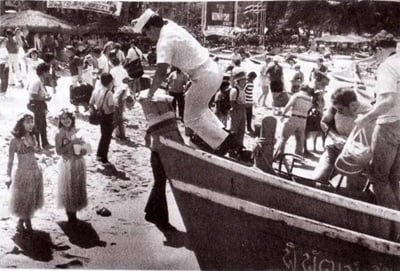Conflicts in the past primarily engaged soldiers in Israel; this time, innocent civilians, including babies and women, became targets.
How do Israelis and the international community bridge the profound gap between Israel’s pursuit of peace and the desire of its adversaries for the destruction of the Jewish people? How can we collectively strive to “give peace a chance?”
Wine: A Catalyst for Dialogue and Understanding
Various projects have emerged to promote peace and solidarity amidst turmoil, illustrating the transformative power of wine initiatives in conflict zones. In response to the recent crisis, the Israel Wine Producers Association rallied for solidarity, encouraging supporters to “take a sip for solidarity.” Through this initiative, 10 percent of sales from US distributors are allocated to Israeli relief efforts. Similarly affected were kosher California winemakers such as Herzog Wine Cellars, actively participating in fundraising endeavors to support their Israeli counterparts.
Among these initiatives, Wine for Peace in Israel has become a beacon of hope. This project showcases Israeli wine brands and spearheads efforts to advocate for peace in conflict-stricken regions. Notably, the organization unites winemakers from opposing sides, facilitating collaboration to create a joint wine label. Beyond economic benefits, this initiative fosters relationships and understanding among individuals who might otherwise remain divided by conflict.
These initiatives exemplify the potential for peace to flourish, even in the most challenging circumstances. Through the shared language of wine, bridges are built, and dialogue is fostered, offering glimpses of reconciliation and harmony amidst adversity.
Wine in the Crossfire
Impact of conflict on wine production and distribution
Vineyards in Israel face severe consequences in conflict zones that affect both wine production and distribution. The devastation of vineyards hampers winemakers’ ability to maintain their craft, while disruptions in transportation and wine trade routes limit market and consumer access. The impact of conflict on the wine industry is significant, exacerbating the challenges that wineries in these volatile areas must overcome.
Challenges faced by wineries in conflict zones
Israeli wineries in conflict-ridden regions of Israel are up against numerous challenges that threaten their survival. Security concerns require the implementation of emergency protocols, which increase operational costs and limit growth opportunities. The lack of infrastructure and resources also hinders the wine industry’s development. Despite these obstacles, these wineries demonstrate remarkable resilience, using their passion for winemaking to overcome the difficulties they face.
Wine is a target of destruction and vandalism
In times of conflict, wines, and particularly Israeli wines, often fall victim to destruction and vandalism. Extremist groups, such as Hamas, target wine due to its cultural and religious significance, seeing it as a symbol of their opposition. Wineries and wine shops become targets, with their products destroyed or confiscated. This intentional destruction of wine culture deepens the wounds of war, stripping communities of a vital aspect of their heritage and identity, and compounding their grief.
Navigating the Intersection
When considering the ethics of consuming wine from conflict areas like Israel, it’s important to be mindful of the effects our choices have on these communities. Supporting the sale of wine from Israel can provide economic stability for wineries and help preserve cultural heritage. By choosing and enjoying their wines, we show support and foster resilience in the face of the adversity these community’s encounter.
Supporting wineries in regions like Israel not only appeals to international customers but also requires a concerted effort from consumers, wine importers, and policymakers. By encouraging importers to source Israeli wine and advocating for fair trade policies, we pave the way for these wineries to thrive. Moreover, backing organizations that extend financial and technical support to Israeli winemakers in conflict zones can profoundly influence their capacity to overcome the challenges they face.
Wine and War: The Intersection
The intersection of war and wine culture, with a focus on Israeli wine, is intricate and layered, raising ethical considerations. It involves understanding the struggles of wineries in conflict zones like Israel, recognizing wine’s potential as a peacemaker, and considering the ethical implications of engaging in the wine trade from these areas. To navigate this complex intersection, we must find a thoughtful balance between supporting those impacted by conflict and actively seeking peace and understanding.
In the face of these threats, the Israeli government must act decisively to safeguard its winemaking industry. This may entail bolstering security at Israeli wineries, collaborating with law enforcement to track down the perpetrators, and formulating policies to fortify the winemakers and wine producers. Such proactive measures will reinforce Israel’s commitment to its wine exports and the protection of its wineries, sending an unequivocal message against terrorism and economic disruption.
Going Forward
During times of conflict, supporting the wine industry in Israel may take on added significance as a means of promoting economic stability and resilience. Here are some ways we can support Israeli wines during such times:
1. Continue purchasing Israeli wines
Despite challenging circumstances, continuing to purchase Israeli wines sends a message of solidarity and support to the wine producers and the broader community. Look for Israeli wine brands in local stores or consider purchasing directly from wineries through online platforms.
2. Explore online purchasing options
If purchasing Israeli wines in person is not feasible due to safety concerns or logistical challenges, consider exploring online purchasing options. Many Israeli wineries offer online sales and shipping services, allowing consumers to support them from a distance.
3. Share information and advocacy
Use social media and other platforms to share information about Israeli wines, the challenges faced by the industry during times of conflict, and ways consumers can support them. Advocating for Israeli wines can help raise awareness and encourage others to show their support.
4. Donate to relief efforts
In addition to directly supporting the wine industry, consider donating to relief efforts to assist communities affected by conflict in Israel. Helping humanitarian organizations provide aid to affected communities can help alleviate some of the broader impacts of the conflict.
5. Stay informed and engaged
Stay informed about developments in the region and the wine industry in Israel. Engage in discussions about the economic and social impacts of conflict on the wine industry and explore ways to advocate long-term resilience and sustainability.
By taking action, we can support the Israeli wine industry during conflict and enable economic recovery in affected communities.
© Dr. Elinor Garely. This copyright article, including photos, may not be reproduced without written permission from the author.
This is part 3 of a 3-part series.
Read Part 1 Here:
Swords to Shiraz: Exchanging Conflict for Cabernet in the Pursuit of Peace in Israel





